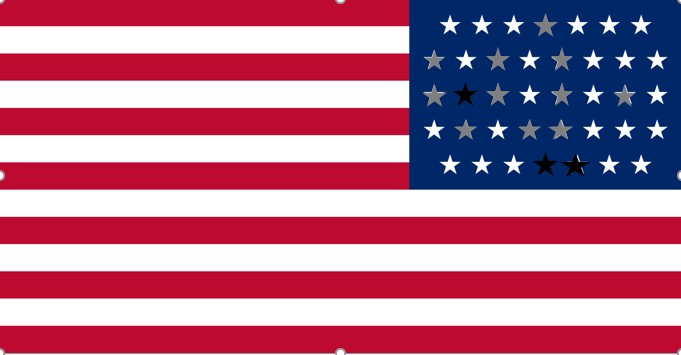The Supreme Court, of the corporate United states, decides Norton v. Shelby County (Tennessee): “An unconstitutional act is not a law; it confers no rights; it imposes no duties; it affords no protection; it creates no office; it is inoperative as though it had never been passed.”
[restored 5/14/2022]
The Supreme Court hands down County of Santa Clara (California) v. Southern Pacific Railroad, overturning Bank of Augusta (Georgia) v. Earle, declaring that a corporation is a person as defined by the fraudulent 14th amendment, section 1, and thus entitled to equal protection under the laws.
NOTES:
- Bestowing personhood upon government chartered corporations, may have contributed to the backlash against the eastern, big business establishment: six years later the upstart Populist (socialist) Party shook-up the political landscape by capturing 8.5% of the popular vote, and 22 of 444 Electoral Votes, from the established Republican (nationalist) and Democratic (constitutionalist) Parties. In 1896 the socialist victory was complete, as the Democrats nominated the Populist Party candidate, former Representative William Jennings Bryan, of Nebraska.
- This was not the decision of the court, but a headnote added by the court reporter.
[restored 5/14/2022]
Because of a mistaken interpretation of a Supreme Court reporter’s notes in an 1886 railroad tax case, corporations are now legally considered “persons,” equal to humans and entitled to many of the same protections guaranteed only to humans by the Bill of Rights – a clear contradiction of the intent of the Founders of the United States. The results of this “corporate personhood” have been:
- Unequal taxes,
- Unequal privacy,
- Unequal wealth,
- Unequal trade,
- Unequal media,
- Unequal regulation,
- Unequal responsibility for crime,
- Unequal protection from risk, and
- Unequal citizenship.
Government chartered corporations, aided by government chartered corporate attorneys seized upon this mere head note to capture undue corporate personhood, which may have contributed to the backlash against the eastern, big business establishment; as six years later the upstart Populist (socialist) Party shook-up the political landscape by capturing 8.5% of the popular vote, and 22 of 444 Electoral Votes, from the established Republican (nationalist)and Democratic (constitutionalist) Parties.
In 1896 the socialist victory over the ‘old’ Democratic Party was complete, as the ‘new’ Democrats nominated as the Populist Party candidate, former Congressman William Jennings Bryan, of Nebraska. (However the nation elected William McKinley, who favored the Gold Standard over Bryan’s advocacy of Free Silver.)
Grover Cleveland was President, though we do not accuse him of collusion. Corporations seized on this new legal concept and got CONgress and subsequent courts to accept it as a decided fact. I feel this was the single event that has led to the rise in corporatism, and thus the American Fascism we see today in the American warfare/welfare state at this writing, 13 July 2006. —— JL
In any event, not granted but seized, unlawful corporate personhood is still with us and the artfully evaded lawful Gold Standard is a fading memory. [I think these suggestions clarify these points for the casual reader. JKL, 18 July 2006.]
Subsequent Events:
Authority:
Article I, Section 8 [Clause 18]
ccc-2point0.com/constitution-for-the-united-states
Article VI, Section 2
ccc-2point0.com/constitution-for-the-united-states
“Law of the Jungle”
ccc-2point0.com/preface
References:
Norton v. Shelby County, 118 U.S. 425, 442 (1886).
County of Santa Clara v. Southern Pacific Railroad, 118 U.S. 394, 413 (1886).
Thom Hartmann, Unequal Protection: The Rise of Corporate Dominance and the Theft of Human Rights, (New York: Rodale, 2002), 3.


